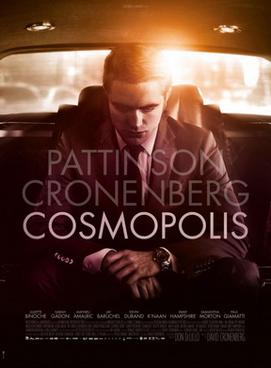Eric Packer (Robert Pattinson), a 28-year-old billionaire
currency speculator, rides across New York City in an ultra-high-tech stretch
limo en route to his favorite barber for a haircut. Along the way, he takes
counsel with various advisers and associates, is sexually rebuffed by his new
wife (Sarah Gadon), receives some troubling medical news, encounters protestors
and would-be assassins, and risks losing his fortune on the performance of the
yuan.
Adapted and directed by David Cronenberg from a Don DeLillo
novel, Cosmopolis boasts an
impressive pedigree, something that makes its ultimate failure all the more
disheartening. DeLillo’s dense works are not exactly film-friendly, but don’t
fault Cronenberg for trying. His precise direction succeeds in conveying both
the sterile isolation of the rich and the savage chaos of the downtrodden. A
deft score by Howard Shore and the indie rock band Metric matches the film’s
moods and heightens tension in key moments.
Sadly, that (and a quirky supporting turn by Paul Giamatti as
a deranged ex-employee) is all that Cosmpolis
has going for it. The script treats the majority of its characters as mere vessels
for philosophical meandering about life, class, violence, leisure, etc. As a
result, the talents of Samantha Morton (among others) are wasted as lines are
delivered awkwardly and robotically by the flattest of characters. Accordingly,
Pattinson is wooden in the lead role, likely quite intentionally. While this
was undoubtedly intended as a critique of the soullessness of the upper class,
it comes off as excruciatingly banal and pretentious at times.
Like the characters’ conversations, the film tends to wander
without plot or purpose. Everything that should matter - Packer’s crumbling
fortune, the riots, and the threats on his life – is literally pushed into the
background as his limo continues on its seemingly never-ending odyssey. Again,
this is by design (the rich as out of touch, remember?), but Cronenberg should
have realized that it is possible to get a message across. It isn’t until the
end when Packer meets his philosophical opposite and things have actually
happened that Cosmopolis gains
traction, but by that point, it is too little, too late.
Cosmopolis may have been
intended as a timely conversation-starter, but its big ideas and stylish
presentation are marred by long stretches of off-putting blather.
6.5/10

No comments:
Post a Comment